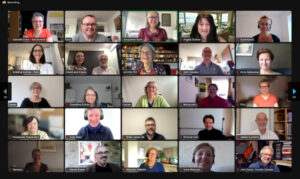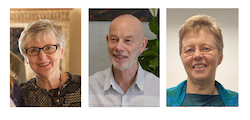In September 1996, I started Grovian Metaphor sessions with Philip Harland. This turned out to be a regular monthly event for three years: three years of therapy was more than I had planned for, but it was such fun to do. It took a few sessions for Philip and I to build up the trust I needed, but once that was established I let all the demons out of the closet: all those secrets I had kept hidden since a boy. In my dreams they were monsters but when they came into the light they turned out to be just thin, tired, old men so grateful at long last to have been let off the hook.
I built a rich metaphorical landscape over the three years: an Island, or ‘I-land’ inhabited by people and animals and forests and rivers. Philip and I spent hours identifying different needs, developing them into different characters, which inhabit my ‘I-land.’ The more we talked, the stronger my belief in the Island and all who inhabited it.
Each character told me their story. They introduced themselves, they showed attitude in the way they stood before me, and told me their names. Names like Gardener, Wanderer, Boy, and Shadowman to name a few. As they developed their personalities, I recognised my need to bring them physically into my life.
So I developed a pendant for each one: I call these my ‘Inde-Pendants.’ They sit on my desk, each pendant resting on a small sea-worn piece of slate I found this summer on a Cornish beach. These Inde-Pendants are troublemakers (in the best sense of the word) — they never do the things I expect of them as they always manage to think of something better to do. They are provocative. They grow in confidence daily.
Last year, after forty-eight sessions, I had to stop the sessions and I was left wondering, “What happens next?”
To my delight, I found myself continuing to use Grovian Metaphor to question the world around me. Last week is a case in point. I was filming a group of eight men, all in their late thirties, all talking about their experiences of travelling with an airline. As I watched this group interact, I began to think of them as metaphors. I began identifying each man by one dominant attitude: Mr Loud, Mr Happy, Mr Chip or Mr Status – and the filming went like a dream.
Again, yesterday I was talking with a colleague. We have a project that needs completing by the end of the month and I felt there was a problem over identifying priorities and a serious risk of falling behind schedule. At first, there was antagonism and the discussion was going nowhere, so I introduced the use of metaphors into our discussion.
The first result was we both calmed down, and the second was we started to use our imaginations. I began by picturing the project as a mountain. Using Clean Language prompts such as ‘Climbing like what?’ I started to build the metaphor. I pictured myself as a climber, making my way towards the summit and I was expecting my colleague to be alongside. However, she wasn’t.
She said she saw herself as a mountain goat, jumping from ledge to ledge. We discussed the benefits of being a mountain goat and she said she liked to move from area to area rapidly and also to sit and admire the view. This was different to my point of view, climbing steadily towards the summit, seeing only six inches of grey granite rock face in front of me. I suddenly realised I was not allowing myself to stop and reflect on the broader issues.
We both benefited from our discussion. I saw her in the corridor this morning and she said in passing, “I see you’re still on the rock face!” That is all she said, but it prompted me to stop working for a few minutes, and look at the world from the mountainside. What a glorious view it was.
So you see, nowadays I find myself questioning everything. I have learnt to play again. I turn words around: I don’t ‘write down’, but ‘write up’, a ‘deadline’ is a ‘lifeline’, a ‘victim’ is a ‘survivor’. I can transform embarrassing moments out of my past into positive-charged metaphors. I play with thoughts, with ideas, with words and I can’t lose.
It is four years ago when I first visited Philip at his home in Crouch End, North London. In those days, Crouch End was just his address, but nowadays I think, “Crouch … End … What a great address for a therapist.”
Joseph Campbell








